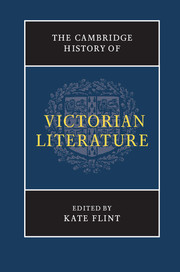Book contents
- Frontmatter
- Introduction
- PART I AUTHORS, READERS, AND PUBLISHERS
- 1 Publishing and the materiality of the book
- 2 Victorian reading
- 3 Periodicals and reviewing
- PART II WRITING VICTORIA’s ENGLAND
- PART III MODES OF WRITING
- PART IV MATTERS OF DEBATE
- PART V SPACES OF WRITING
- PART VI VICTORIAN AFTERLIVES
- Select bibliography
- Index
2 - Victorian reading
from PART I - AUTHORS, READERS, AND PUBLISHERS
Published online by Cambridge University Press: 28 March 2012
- Frontmatter
- Introduction
- PART I AUTHORS, READERS, AND PUBLISHERS
- 1 Publishing and the materiality of the book
- 2 Victorian reading
- 3 Periodicals and reviewing
- PART II WRITING VICTORIA’s ENGLAND
- PART III MODES OF WRITING
- PART IV MATTERS OF DEBATE
- PART V SPACES OF WRITING
- PART VI VICTORIAN AFTERLIVES
- Select bibliography
- Index
Summary
In 1847, Sir Arthur Helps began an essay on reading with the dutiful observation that ‘It appears to me remarkable that this subject should have been so little touched upon’, but one sometimes feels that the Victorians touched on little else. Literacy was credited for reducing criminality and blamed for encouraging sexual licence; the topic fuelled both visual and verbal media, writing and speech. When twenty-first-century scholars gain access to nineteenth-century clichés about reading, they do so via print; but the Victorians themselves used the spoken word to praise writing. Sermons remained the traditional venue for arguments about the benefits and dangers of the printed word, but by the 1830s they faced secular competition from after-dinner speeches of benevolent organizations, lectures at the opening of mechanics’ institutes, and public addresses like Ruskin’s Sesame and Lilies – not to mention Parliamentary debates, themselves transcribed in shorthand and read by many more people than those who had heard them. To read that record now is to remember how many of the policies over which Victorian MPs argued related, directly, or indirectly, to literacy. Schools, libraries, copyright law, postal rates, and above all the taxes that determined the pricing of printed matter: the institutions that the Victorians established, reformed, and attacked were centrally concerned with reading.
- Type
- Chapter
- Information
- The Cambridge History of Victorian Literature , pp. 34 - 55Publisher: Cambridge University PressPrint publication year: 2012
- 4
- Cited by

